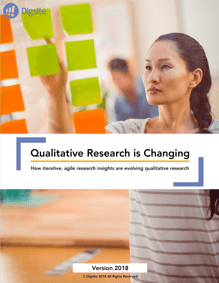Succeeding in today’s constantly evolving consumer landscape starts with being able to move quickly and use data to make the best decisions. This is why more and more organizations are taking an agile approach to just about everything from innovation, to marketing, to research and customer experience design. In this post, we will explore the skills you need to cultivate in your consumer insights teams to support agile development.
All kinds of companies—including financial services and insurance organizations, consumer packaged goods businesses, and even institutes of higher learning—turn to agile in hopes to enjoy better business outcomes. To bring the process to light, let's look at Cargill, a food manufacturer and the largest privately held US company which traces its roots back to 1865.
To move faster and create even better products, Cargill decided to embrace agile research within their consumer insights function. Like many companies, Cargill had been relying on traditional methods and vendors to collect the data they needed to figure out the best way forward. Not only was this approach too slow and expensive, it also wasn’t helping Cargill reach their innovation goals.
Seeking a better way forward, the Cargill team decided to make the move to a more agile, sprint-based research approach. They haven’t looked back since.
“Agile is becoming the way we do research—it’s exciting and liberating,” explains Cory Lommel, Cargill’s director of Consumer Insights. One important part of that transition was getting this team more directly involved in collecting and analyzing research data. “You learn more and internalize it better if you do it yourself.”
The decision to move to agile has been incredibly beneficial for Cargill—which means it can be incredibly beneficial for all kinds of businesses, regardless of industry.
Unfortunately, you can’t just decide to move to agile and get amazing results. Like anything else, you need the right plan and the right tools.
With that in mind, let’s examine some of the key characteristics that successful agile insights teams have—like the folks over at Cargill. Then we’ll explore some of the tools that can help you take your agile efforts to the next level.
Traits to build in your Agile Research Team
You probably have some great researchers in your organization, but they might not have the experience to be successful with agile research out of the gate. So you can’t just snap your fingers and expect your organization to move forward with agile research overnight. If your organization has always conducted research one way, it might take some convincing to get your team on board with a new approach.
While trying to raise the profile of online agile research at your organization, start first by socializing the concept and letting people know about its benefits. Demonstrate how effective agile research can be to your colleagues and then start figuring out which of them might be best suited to participate in your agile research initiatives.
When discussing this challenge with Cargill and others, we identified four traits that help consumer insights teams thrive in an agile environment.
-
Flexible
The best agile researchers are highly flexible. They simply love doing research and they are comfortable not only with design, analysis and reporting – they are comfortable talking directly to consumers. Since agile teams are small, the best members have the flexibility to play whatever role is needed to keep the team moving.
- Creative
Great agile teams are built on the backs of creative employees. These folks think outside of the box and understand that they need to balance between risk and rigor . Through repeated research and iteration, they also know that they can continuously learn and get closer to the truth. The right team members should be ready to brainstorm scrappy approaches to test ideas day in and day out.
- Experienced
You can’t expect to throw a novice into battle and get great results right away. As such, the best agile researchers are experienced. They know how research is conducted—and they know how to ask questions, what kinds of questions to ask, and how to minimize bias. At the same time, they’ve seen research change over the years and understand that it’s still changing today. Conducting research with agile research tools excites them because they know they will get even better results.
- Immersed
Effective contributors are ready to fully immerse themselves in the research process, internalize customer insights and discuss the implications of all of them with the rest of the team. Truth be told, they live and breathe research and are keen on drilling down as deeply as they can and collaborating with a team to address customer pain points to the best of their ability.
Now that you have a good idea of the kinds of people that do best in agile research settings, let’s shift our attention to the tools agile teams need to thrive.
Are you ready to make better decisions faster with agile research?
If your company has been conducting research one way for many years, there is no better time than today to seek out agile market research approaches. By tapping researchers on your team who are flexible, creative, experienced, and ready to become fully immersed in their work—and by equipping them with the right tools that set them up for success—you can reduce the learning curve significantly and take the training wheels off as quickly as possible.
To learn more about why agile research is the future and how your team can get the results you’re hoping for with the right approach, download our ebook, Qualitative Research Is Changing: How Iterative, Agile Research Insights Are Evolving Qualitative Research.





